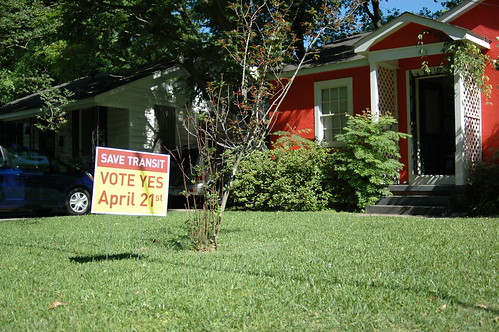In Baton Rouge last week, our event was on the same night as a big vote on transit funding. The vote was a big deal — a yes outcome would infuse over $10 million into the area’s struggling transit system, lowering average wait times from 75 to 15 minutes, increasing the number of routes, and installing amenities like signage and shelters at bus stops.
A no vote would pretty much spell the end of public transportation in Baton Rouge.
It was close.
Towards the end of our event, after 8, when the polls closed, I looked up the results. One news station was calling it for the “no” votes. That was the expected result, someone at the back of the room said. It’d never pass.
But later, after we’d cleaned up and gotten back to our host’s house, it turned out that call was too soon — it was a narrow yes, with 54% of voters sticking up for public transit.
The transportation system in Baton Rouge is fraught in other ways as well. Here’s one illustration of the problem:
I-10, where we’d been stuck in traffic several times for no apparent reason on our way into town, had recently been widened, we were told. But, as is the wont of interstates, by the time it was built, it was already more congested than it had been previously. It’s a perfect illustration of induced demand, a concept I talk about every night on tour.
Mark Martin, our host for the weekend, started riding a bike seven or eight years ago, was appalled at the conditions, and started the bicycle advocacy group B.R.A.S.S. (slogan: “It takes BRASS to ride in Baton Rouge!”). The stock art on the cover of the city’s 2004 bike map sums up the bike situation neatly:
The vehicularists have had their way here. A few sharrows litter the streets, but it’s clear that little has been done to create friendly conditions or connections for bicycling. That’s changing this year, though it took the tragic death of a young father this January to put substantial progress on the horizon — two trails are being connected through parks and developments that will provide a reasonable alternate route to the busy arterial where the fatality occurred.
Mark and several others are also creating their own bike map, online. The one I was given, he said, has one good route on it; the rest of the lines aren’t well-connected or else just don’t indicate truly bike-able streets. In researching the new map, Mark said, one great irony has stood out — the only Whole Foods in town cannot comfortably be reached without a car.
Mark’s battle weariness was clear, though his energy for forcing bikes into the conversation seems unending. We arrived a day early, much of which we spent talking with him, resulting in wondering how anyone in Baton Rouge can ride a bike at all. Fortunately once our event began a different side of the city’s culture showed itself — people trickled in, all smiling and laughing and radiating enthusiasm.
One of the most upbeat was Tina Ufford, who told me the story of Critical Mass. She stopped attending the rides years ago, she said, because of the aggressive attitudes of some among the large pack; but after a hiatus she decided on a whim to go to the meeting spot on a final Friday in January. “There were nine of us,” she said, “and every single one of us went on to begin something big in Baton Rouge.” The nine revitalized Critical Mass, which, Tina said, tends to delight rather than annoy passersby. “It’s the parade culture,” she explained. Now it’s not uncommon for 300 people to participate in one of the monthly rides.
Clearly bicycle culture in Baton Rouge is strong — if you can draw people onto the streets. Group rides and events create, temporarily, a similar effect to bike-friendly infrastructure. In Baton Rouge, surely, the people have the power to get their streets fixed permanently as well, if the energy we saw in that room is any indication.
And, we were told, on an ordinary night there would have been even more people filling the room with their good natured cheer — but everyone else was out getting out the vote for transit that night. And winning.


